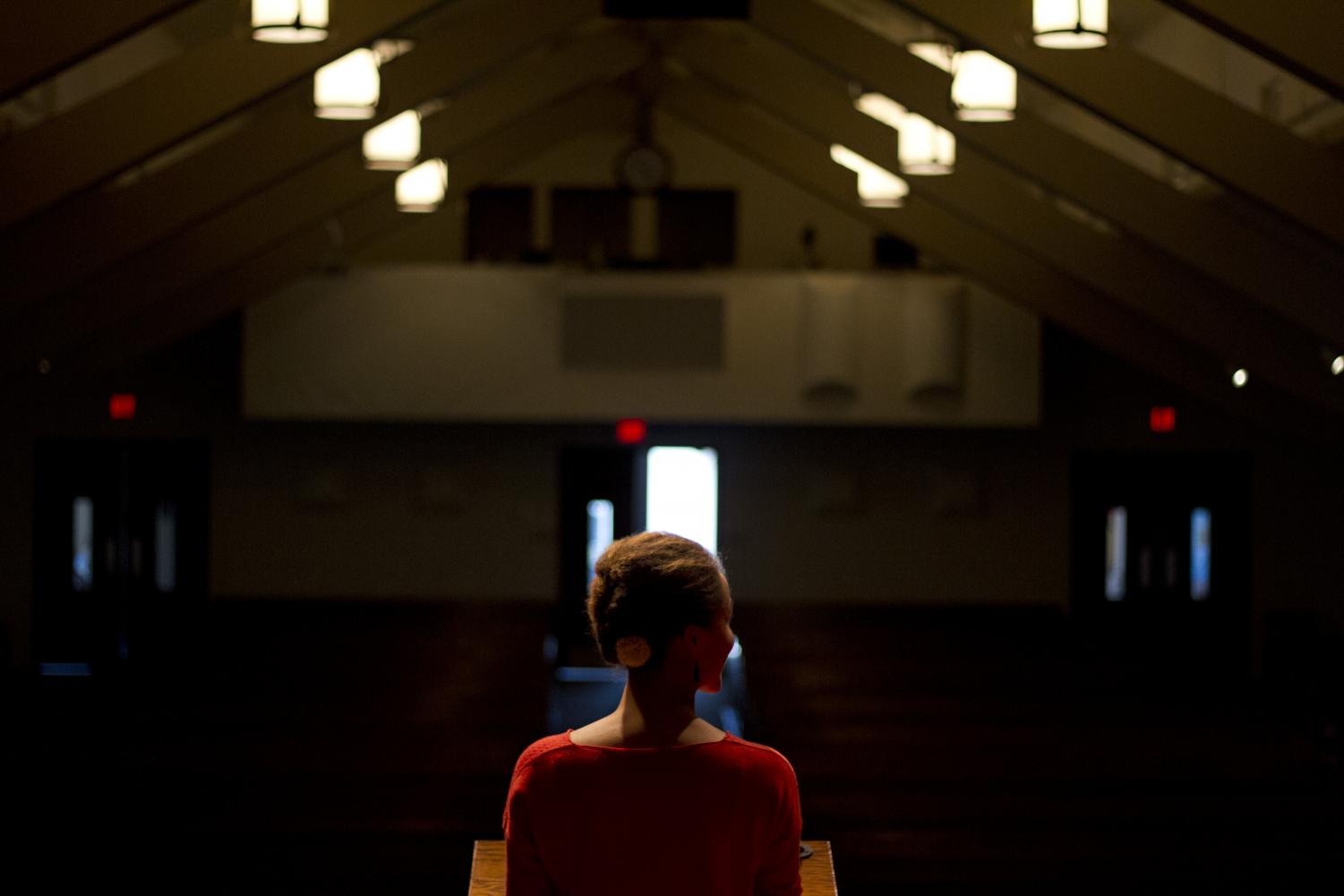Written by Rebecca Nakashima
Sherry Mortenson answered the phone in 1978 from inside her University of Minnesota sorority house to hear a questioning female voice. The girl, a student at Bethel University, wanted to come to share her testimony. As the sorority president and someone who was worried about the drinking habits and relationship choices of her fellow sorority sisters, Mortenson quickly agreed to the visit. It was this first encounter that ultimately led to sophomore Mortenson praying to receive Christ later that year. Not having grown up in the church, she went almost immediately from graduating college with a degree in broadcast and consumer affairs to working at becoming a pastor as a “baby Christian,” completely unaware of the roles women play in the church.
As someone who has spent her entire college career in the center of this debate, Biola senior Bible major Marie Bakerpoole has had to deal with the hard questions that come along with pursuing her call to pastoral ministry. As a 12-year-old pastor’s kid, she remembers talking with her mom about the subject of women in leadership in the church. Even from a young age, something did not seem quite right to Bakerpoole about a God who loved and created everyone equally, yet did not allow some to serve the church body in the same capacity as others.
Exploring the Debate
The debate over whether women are biblically able to hold leadership positions in the church was raised as early as the 1700’s and has resulted in two divided camps: complementarians and egalitarians, according to Dr. Ron Pierce, professor of biblical and theological studies at Biola. The complementarian side believes men and women to be equal in being but not in function. Women have different and even subordinate roles to play. In contrast, egalitarians advocate for equality in being and function, as they interpret both come together in the Bible.
Pierce feels the debate really stems from two main areas. The first being cultural factors on both sides. For complementarians, culture conjures up the “good old days” of the 1950’s when each gender had specific expected roles. On the egalitarian side, the rise of feminism colors how they are perceived. Secondly, people really want to know what the Bible teaches about this subject, and it is not explicitly spelled out for them.
“At times I’ve said if I had grown up in the church and heard all of these different messages of what women’s roles are, I don’t know if I would have been naive enough to be the woman God’s called me to be,” Mortenson says.
Women “Pioneers” in the Pastorate
Of course, Mortenson was not aware of any of this when she entered seminary with the intent of getting her Master of Divinity to go on to be a youth pastor. At this time, Mortenson’s career in guest speaking began, and it eventually paid for her last year in seminary. This new ministry was something that she never sought out or pursued but instead came naturally as regular appointments that God always arranged. If she didn’t do anything and someone asked her to speak at their church or college, she felt like the Lord was in it. That was one of her ways of knowing that it was God and not her trying to promote herself. It was when she began speaking frequently that she experienced pushback for the first time.
Mortenson describes her role as a female pastor as the “token woman” and “pioneer.” For many churches she spoke at, she was the first woman ever to take the stage on a Sunday morning. The respect that comes naturally to male pastors simply based on their title and gender never happened for Mortenson: It was something she had to earn. Often, when she preaches and God speaks to people through her, the focus is on God rather than herself, something she is grateful for.
“Life is not fair and you need to follow Christ and be prepared for what it means to truly give your life and serve him,” Mortenson says. “It is definitely not the easy road, and it goes back to call. If God has not called you to this, you will not be able to survive and serve him.”
Biola Student Encounters the Tension
This is a journey that Bakerpoole had to go through herself. Coming from a family background that supported her decision, Bakerpoole entered her first year of Biola in 2008 admittedly naive. She was very open to those she interacted with about her stance on the issue of women in leadership and her calling to become a pastor.
“I just came with this idea that Scripture clearly teaches that women can have the same leadership positions in the church as men and Bible professors have got to see that,” Bakerpoole says.
Bakerpoole was quickly introduced to what her time at Biola would really look like. During her very first week at Biola, she began a dialogue with another student who had a different opinion about this issue. By the end, Bakerpoole walked away from the conversation having been called “rebellious” and “sinful.” Even harder for Bakerpoole to accept was the hostility she experienced from professors as well. In an instance where a professor was telling the male students in the class they would have to choose between seminary and some other option, he completely skipped over Bakerpoole with a blank stare and dismissive statement about her being a woman and therefore not able to go to seminary.
Mortenson shares how she experienced discrimination herself in one of her seminary classes. After preaching a sermon she had prepared for an assignment, the whole class spent the next 20 minutes trying to figure out how she had done it, since women were not supposed to do that.
“Finally, it came down to that I was in speech and debate in high school, and that’s why I could do it … couldn’t be that God called me to it,” Mortenson says.
Biblical Basis Behind the Debate
Looking at the exact same passages in the Bible, complementarians and egalitarians end with very different interpretations. The question is, did women function in leadership roles in the New Testament? In I Corinthians 11:5, “Every woman who prays or prophesies with her head uncovered dishonors her head,” it seems to egalitarians that Paul’s only concern for women is that they dress appropriately within their culture. What he does not seem to be concerned about is them praying and prophesying.
Again, complementarians look at I Timothy 2:12, “I do not permit a woman to teach or to assume authority over a man,” and take it exactly for what it says. Differently, egalitarians look at the passage in the context of the city of Ephesus and its role as the epicenter for the Artemis cult. Pierce interprets it as Paul speaking to the women who were priestesses in the cult or were simply influenced by the cult before converting to Christianity, and entered the church thinking they could lead there as they had done in the temple of Artemis. Instead of forbidding women to exercise authority, egalitarians say Paul is prohibiting the usurping of power from women who would do better to simply listen and learn for a time.
“The essence of the gospel is that in Christ we are all one,” Pierce says. “So, as much as people in this debate would like to say that this is just a secondary issue, Paul says [in Galatians 3] that there is a connection; that if we are really one in Christ then these [old distinctions] just don’t matter anymore.”
Opening the Door to Woman Pastors
In her last week of seminary, Mortenson was holed up in the coffee shop wearing a worn pair of sweats and no makeup, scrambling to finish a number of papers that were due within the next three days. At the time, the office of the president of Bethel, George Brushaber, was above the coffee shop, and as Mortenson was furiously typing away he leaned over the staircase and asked her up to his office.
“I remember thinking, ‘Can I go into the president’s office, the holy of holies, with sweats on?” Mortenson says.
She was just as confused when he offered her a new position at Bethel University, something that she did not even know about. The position started out with the title of director of discipleship but then became pastor of discipleship, a position she held for 23 years. Her role which included encouraging women in their gifts and using them.
For Christa Mckirland, a graduate student at Talbot, the issue of women in leadership really comes down to who has the right to claim authority. Ultimately she sees God—Father, Son and Holy Spirit—as our divine authority, so for anyone to claim to have authority over another person for any other reason is simply invalid. Instead, Mckirland suggests that people commit to walking in their gifts, remaining obedient to the Holy Spirit and in this way earn the influence to speak into an issue.
Bakerpoole feels the complementarian stance is something that attacks the very personhood of women. Through their actions, she said, rigid complementarians are communicating that women are less than men and are cutting down on their value of who Christ says they are. In fact, gender becomes a moot point in the presence of God’s calling on a person’s life, according to Bakerpoole.
“I just don’t understand why leadership positions are determined by genitalia instead of gifting,” Bakerpoole says.
In 2000, Mortenson left her legacy at Bethel for the West Coast, something that took an extreme amount of trust to accomplish. She is now on staff at Whittier Area Community Church as pastor of spiritual development. It is here that Mortenson has experienced the most opposition to her role as a female pastor. Before starting at WACC, she was warned of a few particular people in the congregation who were especially concerned about women in leadership; one man even stood up during a board meeting and proceeded to boldly voice his opinion. But today, three of the couples she was warned about are now three of her key Bible study leaders.
Terminology Influences The Discussion
As she has worked to become a pastor, Bakerpoole has similarly experienced the immediate red flags that go up in peoples’ minds when they hear the label “egalitarian.” For her, it puts the wrong focus in the wrong places and perpetuates the problem of gender being way too big of an issue. Instead, Bakerpoole is concerned with helping her community at large to grow and putting those needs first as the needs of her spiritual family. From this idea, she coined the term “communitarian” with some of her friends and now identifies with that group.
“Communities thrive when men and women can just work together, and when people can walk in their gifts without being limited by their gender, their race, their social or economic status,” Bakerpoole says.
A few years back, Mortenson was involved with a leadership network that was conducting a study on women leaving the church because they were unable to use their gifts. Limited to serving in very traditional roles, women executives and others who had been called to lead began to give up since there was nowhere for them to truly serve.
“The world’s going to hell and we sit and say that half the people who are helping can’t serve and that’s crazy!” Mortenson says.
Choosing a Liveable Outcome
Mckirland and her husband have come up with a “sum zero” situation. They picture that they get to heaven and are standing before God and he says to them, “You know, you really let Christa do way too much on that earth. She was supposed to submit to your authority as her spiritual head.” Together they have decided that they would rather live for all eternity having heard those words than having God say, “You held her back. You did not encourage her in her gifts. You told her she couldn’t when that is what I had gifted her to do, that was my purpose for her. You inhibited her from walking out her full calling for my kingdom’s sake.”
“If I’m wrong,” Mckirland says, “I can live for all eternity with being wrong about what I’m allowed and not allowed to do. What I can’t fathom is burying my talent because I thought I was supposed to.”





